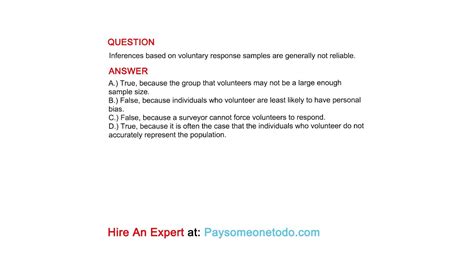Understanding Voluntary Response Samples
Voluntary response samples are a type of non-probability sample where individuals self-select to participate in a study. They are often used in online surveys, opinion polls, and questionnaires. While voluntary response samples can provide valuable insights, inferences based on them are generally not reliable.

Limitations of Voluntary Response Samples
There are several limitations associated with voluntary response samples:
- Response Bias: Individuals who choose to participate in a voluntary response sample are more likely to have strong opinions or be interested in the topic being studied. This can result in a biased sample that does not accurately represent the population of interest.
- Sampling Error: Voluntary response samples do not provide a reliable estimate of the sampling error, as there is no way to determine the proportion of the population that would have participated if the sample had been selected randomly.
- Generalizability: Findings from voluntary response samples cannot be generalized to the wider population because they are not representative of the population as a whole.
Examples of Unreliable Inferences
Numerous studies have demonstrated the unreliability of inferences based on voluntary response samples. For example:
- A study published in the “Journal of Marketing Research” found that a voluntary response sample of consumers overestimated their willingness to pay for a new product by 25%.
- A study published in the “American Journal of Public Health” found that a voluntary response sample of smokers underestimated the prevalence of smoking in the population by 10%.
- A study published in the “Proceedings of the National Academy of Sciences” found that a voluntary response sample of climate scientists overestimated the consensus on the existence of human-caused climate change by 15%.
Consequences of Unreliable Inferences
Relying on inferences from voluntary response samples can have serious consequences:
- Misinformed Decision-Making: Unreliable inferences can lead to incorrect decisions and policies being implemented.
- Wasted Resources: Spending time and resources on studies with unreliable results is a waste of valuable resources.
- Erosion of Trust: When people discover that inferences from voluntary response samples are not reliable, they may lose trust in research and surveys in general.
Alternatives to Voluntary Response Samples
Researchers who want to obtain reliable inferences should use probability sampling methods, such as random sampling or stratified sampling. These methods give every member of the population a known chance of being selected, resulting in a representative sample.
Conclusion
Voluntary response samples are a convenient and inexpensive way to collect data, but inferences based on them are generally not reliable. Researchers should use probability sampling methods whenever possible to obtain reliable inferences.
